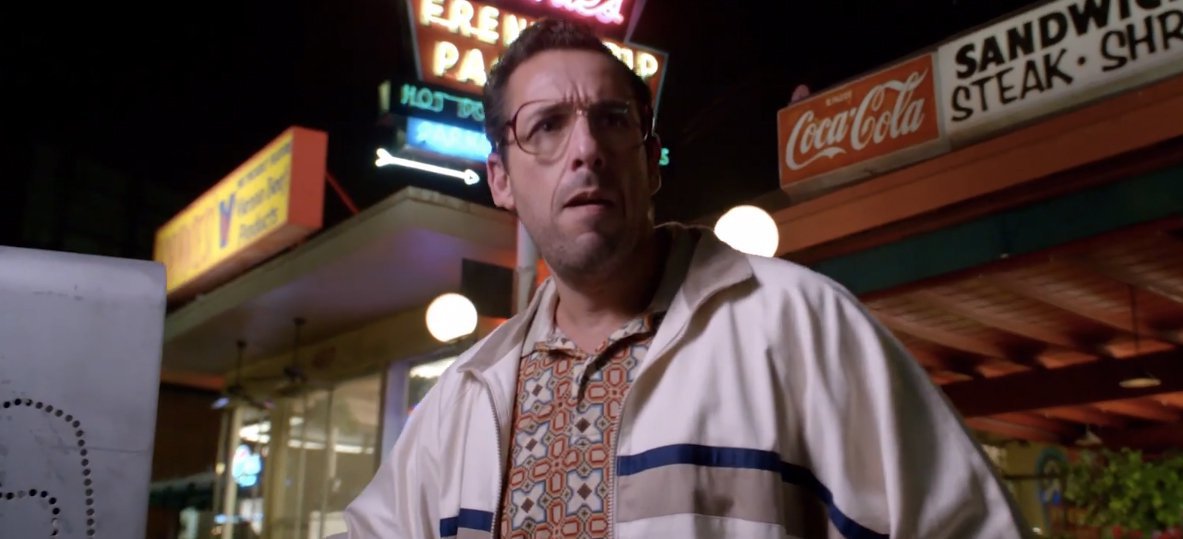
I suppose I should be grateful that the third film of Adam Sandler’s Netflix contract was not as terrible as it could have been. He disgusted me to no end with cringe-worthy Native Americans satire and scatological scenes of horse droppings in The Ridiculous Six. He shocked me with how sexist, homophobic and downright mean he could be in The Do-Over, in addition to nearly making me vomit from the grossest three-way I’ve ever witnessed on film. The best I can say about Sandy Wexler is that it didn’t make me recoil from being grossed out or feeling uncomfortable. It did give me a massive headache for Sandler’s ear-splitting titular character though. Progress?
Actually, calling Sandy Wexler a character might not be accurate. To embody the role of a consistent liar of a talent agent, Sandler throws on dorky clothes and speaks in his most nasally of Jewish stereotype voices. It’s that familiar nails-on-the-chalkboard voice that veteran movie critics know quite well of Sandler’s work. Surprisingly, he doesn’t say anything that offensive about his religion or others. There’s also no scene where we get to hear him wail while he has violent diarrhea or an awkward orgasm. The lack of crudeness and offensiveness allows the audience to appreciate just how unbearable this character is even when trying to be a nice guy.
In the most telling of formats, the story of Wexler’s 1980s/1990s career is told through the stories of celebrities who knew him. These are familiar regulars of Sandler’s usual troupe and seem to have asked the least of most of them for this movie. Most of the celebrity guests show up for one shot to talk nice about Sandler’s fictional character. None of these scenes are particularly funny, meant mostly as exposition and building up Wexler as a weird and determined agent. Even when Sandler plays the loser, he still has to be seen as the character all the supporting players adores. It’s rather surprising that Sandler’s previous film The Do-Over found David Spade’s character wearing a similar outfit to Sandy’s, yet Spade seems to have taken more of a beating as a beta. You know this is a fantasy world when the older neighbor of Sandy finds herself sexually attracted to his voice specifically.
Not all of Sandler’s regulars are so lucky as a few are roped into some awkward and painful bits of comedy as Sandy’s clients. Nick Swardson plays a daredevil who, of course, must suffer bitter slapstick where he slams into cars, signs, buildings and is eventually set on fire. Terry Crews plays a wrestler by the name of “Bedtime” Bobby Barnes, dressed in the theme of pajamas and teddy bears, punching fat wrestlers in the butt. Kevin James plays ventriloquist Ted Rafferty, who desperately wants to bring his act to a children’s television show, but appears just a tad creepy with his insistence on carrying around puppets for every occasion. Colin Quinn can do little more than stammer with anger as opposed to his usually collected, satirical and biting self, to the point where his standup runs out of clean material and he’s heckled off stage. All the while Sandler laughs in the background with that grating cackle, reminding everyone of whose movie this is.
The movie thankfully features Jennifer Hudson’s vocals to contrast Sandler’s aggravating voice. She plays rising star Courtney Clarke, hoping to hit it big as a singer and Wexler eager to nab her for a contract deal. By movie logic of Hudson being so beautiful and Sandler being a dork, he will end up falling for her, she will find herself intoxicated by fame, he will confess his love and a marriage ceremony will be held. One wild card: the ceremony is performed by Kevin James’ puppets, which can perform Catholic or Jewish weddings (bride’s choice).
There is not a single scene where Sander and company lands a joke. None. Most of the humor derives from Sandler making a statement, being called out as a liar and then denying his way out of his previous statement. This is the running joke and maybe the only joke Sandler is willing to commit towards. There are several comical traits that go nowhere with his character’s insistence on not eating bread with meat and his inability to convince dogs not to bite him. All of these bits are just as lazy and tired as Sandler appears in this role, slapping on his old nerdy Jew voice and calling it a day.
Watching Sandler and crew attempt to extract laughs from their audience is about as painful as them extracting teeth. They may not be grossing me out or making me uncomfortable, but they try my patience in how long every scene in drawn out. But these actors are all long past the point of caring. They have become comedic zombies, living off the Netflix cash of Sandler’s movie deal and putting forth as little effort as possible in films that are not worthy of even the lowest of actors. And at over two hours that feels more like four, it’s a chore to slog through and an allegory for Sandler’s movie career: He doesn’t know when to stop.

 “Deadpool & Wolverine” Review
“Deadpool & Wolverine” Review  “The Boys: Season Four” Review
“The Boys: Season Four” Review  “The American Society of Magical Negroes” Review
“The American Society of Magical Negroes” Review  “Twisters” Review
“Twisters” Review  “Sausage Party: Foodtopia” Review
“Sausage Party: Foodtopia” Review  “Robot Dreams” Review
“Robot Dreams” Review  “Godzilla x Kong: The New Empire” Review
“Godzilla x Kong: The New Empire” Review  “Slave Play. Not a Movie. A Play.” Review
“Slave Play. Not a Movie. A Play.” Review 


